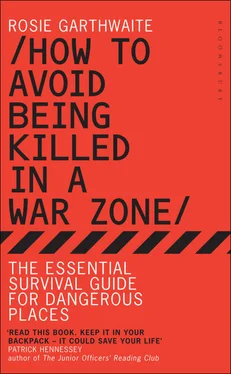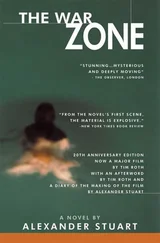Ian Mackinnon is a freelance journalist, now based in Bangkok, where he used to be the Guardian newspaper’s Southeast Asia correspondent. Before that he spent years earning his stripes as Jerusalem correspondent for The Times newspaper, and as a Delhi freelancer in and out of Afghanistan and Pakistan. He told me about his various tea and coffee experiences:
‘Accepting chai (in India), hot sweet tea in Afghanistan, tea with mint in the Palestinian territories, or sweet ‘mud’ coffee is an occupational hazard. You’ve no choice but to accept as it’s part of the hospitality, and to refuse would be impolite and rather militate against breaking the ice. In martyrs’ mourning tents accepting seems doubly important. Drink slowly if sweet “anything” would be your last choice because your cup will be refilled again and again. You’ll get used to it eventually and may even develop a taste for it.
‘The problem is that after the fifth or tenth interview of the day, and many more during the week, you’ll risk getting fat. Worse, in the short term you’ll be bursting for a pee, even in the heat of an Afghan or Gazan summer when you’re sweating buckets. It’s a bigger problem for women, as they’re forced to brave filthy loos. Even for men there are perils to peeing al fresco. In Afghanistan don’t be tempted to wander off the road to pee modestly under a tree. The lurking landmines might take off your foot and spoil the whole day. Standing to pee against a wall is offensive too in Afghanistan and Pakistan, and risks offending local modesty, where it’s polite to squat down. It’s no mean feat.’
FAILSAFE RULES IN ISLAMIC COUNTRIES

/WORKING WITH THE MILITARY
There are two options when dealing with the military: blend in with them and be a legitimate target in the eyes of any opposing force, or stand out from the green or khaki crowd and potentially become a target just because you look different. You might be targeted just because you are a medic, teacher or journalist, and your injury or death is more valuable than the average soldier.
You have to find a way to remain independent while firmly hugged in the arms of the army. I always chose to wear my scruffy press uniform – an enormous shirt and sagging trousers – when I was out on the occasional foray with British forces. Another essential piece of kit was the look I perfected of sympathetic innocence any time we went through the badlands of Basra. I would try to catch the eyes of boys throwing stones and smile as they bounced off my helmet. When it came to winning the troops over, I always worked on making myself very small, almost invisible and out of the way. That is not always easy if you have a lot of kit. You are often reliant on the military for your safety. Don’t piss them off.
Tim Albone told me: ‘Nothing, I imagine, annoys the military more than a scruffy journalist. Soldiers have to wear uniform, shave daily and have their hair cut above the collar: journalists don’t. Having someone hanging around asking lots of questions must be annoying enough. When they are dressed in baggy clothes, with long hair and unshaven, like I often am, it must be worse. When I first went on an embed [an attachment to a military unit in combat] an older, much more experienced journalist told me to cut my hair, tuck my shirt in and have a shave. It was pretty good advice. The more you blend in, the more likely it is that soldiers will open up to you.’
Julius Cavendish is the Independent newspaper’s correspondent in Kabul. He spends a lot of time under canvas on embeds with the military of one sort or another. And, as he explained to me over lunch one day in London, he is learning how to adapt all the time. ‘Putting sniper tape over shiny karabiners and wearing more military-issue clothing so you blend in better with soldiers works. It’s a matter of making the people around you feel comfortable because part of your job is, like a doctor, asking them to lie down and take off their emotional clothing. Otherwise, just try to be nice, despite whatever frustrations Western armies throw at you as you try to report. Being a pushy pain is the best way to alienate people.
‘And take booze. It’s an easy way to buy yourself some friends, especially in countries like Afghanistan, where it’s hard to obtain. This doesn’t hold when you’re interviewing Al Qaeda-inspired fighters, who may be put out by the gesture.’
Patrick Hennessey graduated from being a fellow cider fan with me at university to becoming the youngest captain in the British Army. He has served in Iraq and Afghanistan, and his bestselling book, The Junior Officers’ Reading Club , describes fighting the Taliban in 2007 and how his experiences actually pushed the army to change their rules of engagement. He’s now a civilian studying to become a barrister, and revisiting Afghanistan for various publications – a bit of an unnerving experience, given what he knows about the way the Taliban fight:
‘We find ourselves in an age of messy and complex conflicts in which the lines between combatant and non-combatant are blurred. Listening to intercepts of Taliban radio communications in southern Afghanistan provides chilling insight to how ruthless a modern enemy can be. Having noticed that medics often carry scissors somewhere immediately accessible, snipers are instructed to target anyone carrying first-aid kits or scissors at the start of an ambush. Perhaps of even greater concern to civilians is that the same commanders are well aware that anyone in “blue armour” is likely to be either press or some sort of visiting VIP, and is also to be targeted where possible. The highest protection in some conflict zones, it seems, is now afforded by looking as much as possible like a regular soldier, and although I was cursing that I no longer had a rifle, I was very glad I had my old, desert-cam body armour.’
And Tom Coghlan offers one last tip for travelling with the ‘Allies’: ‘If you embed with US forces, one way to ingratiate yourself immediately is to turn up with packs of Copenhagen Black tobacco – the ghastly chewing stuff. Most American soldiers from the Deep South love it. They tend to be the majority in any army or marine unit. You are “in like Flynn” if you turn up with this stuff. British units are delighted with cheap cigarettes of the Lambert & Butler type.’
‘In any foreign country,’ says Patrick Hennessey, ‘particularly one that may be hostile, making a friend might be the smartest tactical move available, which is why talking to anyone and everyone you meet is a good start.’
Everyone I have ever known who went to a war zone talks of the friends they made there – quick friendships forged in fear, and slow-burning ones developed over many, many months stuck in the same foxhole…or hotel. Those friendships will inform your stay, help you remain sane and maybe even save your life.
Zeina Khodr recommends: ‘Win over the people of the area. They are the ones who will save you, no one else. Except God, of course. In Tripoli, in Lebanon there are so many factions that it is hard to convince them you are independent. We took the time to get to know the hierarchy locally, in the shops, on the street. Halfway through a gunfight some people came up and put guns to our heads. A shopkeeper approached the men and said that we were good people and told them that I had been filming kids who were shot and that we were on the side of the people. They put down their guns and went away.’
The locals have to know that you are on their side, as James Brandon discovered: ‘In mid-2004 I found myself stuck in traffic in a taxi near the Iraqi oil ministry. US troops nearby had set up an impromptu roadblock on a main road that was holding up the traffic ahead. With the windows wound down, the Iraqis caught in the jam soon started talking to each other from car to car. Before long, they discovered I was a Westerner. To make friends, I joined them in complaining about the US troops who were holding us up. Temperatures rose and the traffic showed no sign of moving. Tensions soon began to mount. Complaints that were initially addressed towards the soldiers and towards the West in general were increasingly being addressed to me personally by the increasingly pissed-off Iraqis in the traffic jam. I had to show the Iraqis that I was in the same situation as them, and defuse the growing anger against me.
Читать дальше





![Джонатан Димблби - Barbarossa - How Hitler Lost the War [calibre]](/books/385421/dzhonatan-dimblbi-barbarossa-how-hitler-lost-the-w-thumb.webp)







